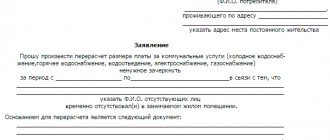When an agreement is concluded with a tenant
An agreement for the payment of utilities is an agreement obliging the tenant of a non-residential premises to independently pay for the resources consumed - water supply, electricity, waste removal, cleaning the territory, etc.
In most cases, the price of renting a premises includes the owner's expenses for paying for utilities, but in some cases the cost of such services cannot be calculated in advance, or it may change significantly every month. Fluctuations in the cost of services may occur:
- when renting premises for new production;
- when converting premises for sublease;
- when renting large retail spaces.
If several non-residential premises located in a residential building are leased to one person for the purpose of unification, then in this case work is inevitably carried out to reconstruct the utility systems. Changing the way a retail or industrial space is operated also changes the level of resource consumption.
Drafting rules and sample
The agreement for payment of utilities is concluded as an independent addition to the lease agreement and must contain the following sections:
- representation of the parties;
- subject of the contract;
- description of the property;
- rights and obligations of the parties;
- rules for calculating and paying utility bills;
- liability for violation of conditions;
- procedure for resolving disputes and terminating the contract;
- additional conditions.
The submission of the parties indicates the full name and passport details for each party, which is an individual, and for organizations it is necessary to provide the full name, location address, as well as bank details and the full name of the responsible manager.
The subject of the agreement is the transfer of the obligation to pay for consumed services from the owner of the premises to the tenant.
The tenant's responsibilities include:
- regular payment of utility bills;
- carrying out routine repairs of communications;
- timely informing the owner about accidents and other emergency situations.
The landlord's responsibilities include forwarding receipts for utilities to the tenant , as well as transmitting information about all hidden features and defects of communication systems that affect the volume of services consumed. Such features may include the lack of meters, water leakage, etc.
In addition, the landlord must inform the tenant about changes in basic service rates.
The procedure for calculating the cost of services is described in accordance with the standards adopted in the region, as well as with the rules defined in Appendix No. 2 to Government Decree No. 354.
The tenant's responsibility for late payments or non-payment of services is established in the form of the obligation to independently pay a fine accrued by the management organization; in addition, in case of regular delays, the owner has the right to terminate the lease agreement unilaterally and demand compensation for losses.
Termination of the contract for payment of services also occurs automatically upon termination of the main lease agreement.
Additional conditions should indicate whether the tenant has the right to delegate authority to pay for utilities to third parties , as well as the conditions for such delegation.
Sample contract for reimbursement of expenses AGREEMENT No. 01/01-07 for reimbursement of expenses
__________ _________
Limited Liability Company "Company", hereinafter referred to as Enterprise-1, represented by Director Ivanov Ivan Ivanovich, acting on the basis of the Charter, and Limited Liability Company "Impulse" represented by Director Sergeev Sergey Sergeevich, acting on based on the Charter, hereinafter referred to as Enterprise-2, on the other hand, collectively referred to as the “Parties”, entered into an Agreement as follows:
SUBJECT OF THE AGREEMENT
1.1. The subject of this agreement is reimbursement of expenses of Enterprise-1 for maintenance (cleaning, maintenance personnel, etc.) of premises occupied by communication networks of Enterprise-2 and reimbursement of expenses for utilities (water supply and sewerage, electricity, heat supply, garbage removal) in accordance with real estate lease agreement No. 01 dated 02/01/2018.
DUTIES OF THE PARTIES
2.1. Responsibilities of Enterprise-1 2.1.1. Enterprise-1 undertakes to bear the costs of maintaining the premises in which the communication networks of Enterprise-2 are located at the address: _________, st. ___________, including on the basis of concluded agreements. 2.1.2. Enterprise-1 undertakes to indicate to the Enterprise a point for grounding connection. 2.1.3. Enterprise-1 undertakes to ensure unhindered passage of employees and partners of the Enterprise with measuring instruments, tools, equipment to the installation site of the Enterprise equipment for the period of installation, operation and repair of communication networks according to pre-submitted lists of the Enterprise; 2.1.4. Enterprise-1 undertakes to promptly issue invoices to Enterprise-2 for reimbursement of expenses within the time limits established by this Agreement. 2.2. Responsibilities of the Enterprise-2. 2.2.1. Enterprise-2 undertakes to reimburse Enterprise-1 for expenses incurred in the manner established in Section 3 of this agreement. 2.2.2. Enterprise-2, within 3 working days after the termination of the Agreement, or in case of early termination, is obliged to dismantle the communication networks and return the location of the communication networks to the owner in good condition according to the acceptance certificate. 2.2.3. Enterprise-2 undertakes to: - maintain the locations of communication networks, as well as the adjacent territory, in full repair, in accordance with the requirements of sanitary and fire inspections; — when operating the equipment, ensure that its specialists comply with the requirements of safety regulations and safety regulations, as well as ensure the safety of electrical wires and their connections in accordance with the current specifications. 2.2.4. Enterprise-2 is obliged to notify Enterprise-1 in writing no later than 30 days in advance about the upcoming vacancy of the communication network locations upon early termination of this Agreement, and hand over the communication network locations to the Theater in accordance with the act in technically sound condition; 2.2.5. If the communication network locations are handed over by Enterprise-2 in a faulty condition, Enterprise-2 pays Enterprise-1 the cost of the necessary repairs. 2.2.6. Enterprise 2 undertakes to compensate for damage in full in the event of loss or damage to the property of Enterprise 1 due to the fault of Enterprise 2, including as a result of a fire.
SETTLEMENT PROCEDURE AND CONDITIONS
3.1. During the period of validity of this Agreement, the cost of reimbursement of expenses of Enterprise-1 in connection with the maintenance of communication networks of Enterprise-2 and utility costs is: - the amount of heating cost is determined by calculation based on established tariffs and the volume of rented area (the volume of rented area is from the volume buildings 0.25%, this value is multiplied by the monthly cost of consumption of thermal energy resources presented by the energy supply organization); — the size of the cost of electricity supply is determined by multiplying the established tariffs by the volume of electricity consumed using the energy meter; — the size of the cost of water consumption and sanitation is determined by multiplying the established tariffs by the volume of water consumption according to the metering and sanitation device; — the cost of services for solid waste removal is determined by multiplying the established tariffs by the volume of solid waste removal per month; — the cost of servicing communication networks is determined at the contract price of 10,000.00 rubles 00 kopecks.
3.2. Reimbursement of costs for electrical and thermal energy is made on the basis of an invoice issued by Enterprise-1 before the 20th day of the month following the billing month. 3.3. Reimbursement of costs for servicing communication networks is carried out by Enterprise-2 until the 30th day of the month following the billing month, on the basis of an invoice issued by Enterprise-1. 3.4. The calculation is made by transferring funds to the current account of Enterprise-1 or depositing cash into the cash desk of Enterprise-1.
RESPONSIBILITY OF THE PARTIES
4.1 The Parties are responsible to each other in the event of non-fulfillment or improper fulfillment of their obligations under this Agreement in the manner prescribed by the legislation of the Russian Federation. 4.2. In case of violation by Enterprise-2 of clause 3.2..clause 3.3. of this agreement, Enterprise-2 pays a penalty in the amount of 0.1% of the unpaid amount for each day of delay in fulfilling the obligation.
FORCE MAJEURE
5.1. Each Party is released from liability for partial or complete failure to fulfill obligations under this Agreement if it proves that it was the result of force majeure (force majeure), that is, extraordinary and unpreventable circumstances under the given conditions, such as fire, flood or other natural disaster. disaster, as well as the issuance of an act of a government body, which the Party could neither foresee, nor prevent, nor take these circumstances into account when concluding this Agreement. 5.2. Exemption from liability is valid only for the period during which these circumstances and their consequences exist. 5.3. Upon the occurrence and termination of the above circumstances, the Party must notify the other Party in writing within 3 (three) days from the date of their occurrence and termination, respectively. The notice must contain information about the nature of the circumstances and their impact on the Party’s performance of its obligations under the Agreement, as well as the expected time frame for their performance. 5.4. In the cases provided for above, the period for the Parties to fulfill their obligations under the Agreement is suspended in proportion to the time during which such circumstances and their consequences apply. 5.5. From the date of termination of the circumstance that served as the basis for suspending the period for fulfilling the obligation, the period continues to run. The remainder of the term is extended in proportion to the time of suspension. 5.6. If such circumstances continue to apply for more than 30 days, each Party has the right to terminate the Agreement without compensating the losses of the other Party.
TERM AND OTHER CONDITIONS OF THE AGREEMENT
6.1. This Agreement is valid from the moment of conclusion until December 31, 2018. 6.2. This Agreement may be terminated by agreement of the Parties, as well as ahead of schedule at the request of one of the Parties in the manner and on the grounds provided for by the legislation of the Russian Federation, upon termination or termination of the real estate lease agreement No. 01 dated 02/01/2018. In case of termination of this Agreement early , The Party wishing to terminate the Agreement is obliged to notify the other Party no later than 30 days in advance. 6.3. This Agreement may be amended and supplemented only by mutual agreement signed by both Parties. 6.4. For failure to fulfill or improper fulfillment of its obligations under this Agreement, the guilty Party shall compensate the other party for losses caused in accordance with the current legislation of the Russian Federation. 6.5. Disputes between the Parties under this Agreement are resolved through negotiations, and if agreement is not reached, the disputes are subject to consideration in the Arbitration Court. 6.6. Each Party is obliged to maintain complete confidentiality with respect to any information relating to this Agreement. 6.7. In cases not provided for in this Agreement, the Parties are guided by the legislation of the Russian Federation. 6.8. The terms of this agreement apply to the relations of the parties arising from February 1, 2021, 6.9. This Agreement is drawn up in two copies, one for each Party. Both copies have equal legal force.
7 LOCATION AND BANKING DETAILS OF THE PARTIES
LLC "Company" Legal address INN/KPP r/s Bank BIK r/s Director ___________________I.I. Ivanov
LLC "Impulse" Legal address INN/KPP r/s Bank BIK r/s Director ___________________ S.S. Sergeev
Other agreements of the owner of non-residential premises
The owner of the rented premises is responsible for maintaining such premises in proper condition, as well as for paying for the resources consumed.
When renting out premises and transferring the responsibility for paying utility bills to the tenant, the management organization can forward the bills to the tenant. If the owner does not have a contract for the maintenance of the premises, then he must enter into other agreements:
- with resource supply organizations (RSO);
- with contractors.
Suppliers provide water supply, electricity, gasification and heating services. Contracting companies organize:
- repair of communications;
- repair and cleaning of the owner's share in common premises and territories;
- collection and removal of waste.
The owner can perform some of this work on his own or hire self-employed people.
When transferring a building for rent in the absence of a management agreement, the agreement with the tenant for payment of utilities must contain additional information:
- a list of resource providers indicating account details;
- a list of work on the maintenance of the premises, which the tenant must organize;
- list of permanent contractors.
A utility payment agreement allows owners to delegate responsibilities for maintaining the premises and paying for consumed resources to the tenant. To prevent termination of the contract and overexpenditure of resources, it is necessary to carefully prescribe the procedure for calculating the monthly payment using current tariffs.
Tenant payment methods for utilities
There are often two options for reimbursement of utility services under a contract, including free use:
- Fixed amount of compensation. This item may consist of two parts - the cost of rent for the premises and the amount of funds to compensate for housing and communal services. Additionally, it is possible to include expenses for Internet, telephone and other services after agreement with the contract participant. The consumer pays the owner of the premises by depositing funds into the current account. Subsequently, the lessor independently pays the enterprises of the North Ossetia region for the supply of hot water and cold water, electricity, etc.
- The floating rate is specified in a separate appendix to the agreement. In addition to the additional agreement, the parties can agree on payment for housing and communal services in a separate document. This will help level out controversial situations. Development and indication of a specific method and form for transferring funds. If one of the participants is not satisfied with the fixed payment option, then you can always conclude a separate agreement for reimbursement of utilities by the tenant.
When to enter into an agreement
It will be better for both parties to enter into an agreement on voluntary compensation for damages by the employee. It is necessary in the following cases:
- If the employee has nothing against compensation, but wants to pay it in installments. In this case, the payment schedule will need to be written down in the document.
- If there are any conditions for compensation of damages. For example, an employee undertakes to independently repair damaged property or purchase new one.
- If the parties have agreed that the employee will pay only part of the damage. These restrictions can only be introduced by the owner of the damaged property.
Contents of the document
An agreement on reimbursement of expenses for utility services is drawn up on a standard form. The paper has legal force after signing by both parties to the agreement. After the date of conclusion of the transaction, the parties are obliged to fulfill the conditions listed in the text for the period established by the agreement.
A document is formed taking into account the opinions of both participants. Endorsed with the signatures of directors of organizations and a wet seal. After this, the contract acquires legal status.
Details and sections
The first part of the paper contains the details of the tenant and the landlord. Further, the points and grounds on which the parties to the agreement make mutual payments and bear responsibilities are spelled out.
Item
The first section in the agreement is the subject of the agreements concluded. In the case under consideration, it is compensation for one of the parties to pay expenses for the use of utilities. Accordingly, the paragraph must provide a list of services for which reimbursement is made.
Rights and obligations when paying for housing and communal services by a tenant
The contract then sets out the rights and obligations of the tenant and the landlord.
In relation to the owner of the premises - the deadline for issuing bills for housing and communal services, formed on the basis of calculations, which are an integral part of the contract. The duties of a legal entity include:
- timely provision of information on tariffs;
- responsibility for maintaining networks in proper quality;
- eliminate violations in the operation of systems;
- eliminate the instructions of supervisory authorities;
- other.
The tenant is charged with:
- make payments for housing and communal services in a timely manner, i.e., within the period established in the contract;
- promptly notify the owner of the premises about changes in the operation of the institution if they affect the consumption of resources;
- do not carry out redevelopment or other uncoordinated actions;
- do not disrupt the operation and arrangement of utility networks;
- compensate for damage and costs caused to the lessor's property, knowingly or through negligence.
In addition, the agreement stipulates the following sections:
- Rental cost and payment procedure for consumed resources supplied by RSO. Experts recommend specifying the time and order of making payments - once every month or two. In addition, a specific date is prescribed, no later than which the account must be replenished according to the document on compensation for housing and communal services.
- The period for which the contract is concluded. As a rule, an average period is used - 12 months or until December 31.
- A mandatory point is the procedure for resolving disputes. The possibility of negotiations is often prescribed. Additionally, the right to go to court is established.
- Conditions for termination and annulment of the contract. At the same time, it is not allowed to establish requirements other than the current laws of Russia.
- The last section is an indication of the bank details of both institutions that endorsed the document.
Due to the legal significance of the agreement once signed by the parties, ignoring the obligations or conditions entails legal consequences. For example, you can indicate in the text of the document the payment of a penalty for each day of late payment.
Compiling a document
There is no unified form for this paper, so it is compiled in free form. The document must contain the following information:
- Name.
- Place and date of compilation.
- Information about the parties and that they entered into an agreement. Indicate the full name of the employee, the number and date of conclusion of the employment contract, the name of the organization, and the full name of its director.
- Description of the situation that resulted in damage and how much damage was caused.

- Whether or not an agreement was concluded with the employee on full financial responsibility.
- An indication that the employee agrees to voluntary compensation for damage.
- Other conditions. For example, that the employer is ready to reduce the amount of the penalty for any reason or that the employee will pay the amount of damage in installments. In the latter case, you will need to write a damage payment schedule: specify the days on which parts of the debt will be collected, or the frequency of payments. Also, if the employee has undertaken to carry out the repairs himself, then this must also be indicated.
- Payment procedure: in cash, by bank transfer or by deduction from wages.
- Employer's responsibilities. For example, upon completion of settlements, give the employee a receipt for receipt of the full amount.
- Responsibilities of the employee. For example, make all payments on time.
- Addresses for sending written notices.
- Duration of the agreement. For example, from the moment it is signed until the day when all obligations are fulfilled.
- Number of copies of the document.
- Details of the parties. For an employee this will be: full name, passport details, registration address. For the employer: company name, INN, OGRN, KPP, current account, correspondent account, BIC, bank name.
- Signatures of the parties with transcripts.

The document is drawn up in two copies: for the employer and the employee.
Contract for reimbursement of utility costs
Moscow "___" ___________ 201_
Open Joint Stock Company "_______________________________" (short name - OJSC "__________"), hereinafter referred to as the "Executor" represented by the General Director _______________, acting on the basis of the Charter, on the one hand, and the limited liability company "__________________________________________" (short name - LLC “___________”), hereinafter referred to as the “Consumer”, represented by the General Director _______________, acting on the basis of the Charter, on the other hand, and together referred to as the Parties, have entered into this indemnity agreement (hereinafter referred to as the “Agreement”) as follows:
1. TERMS AND DEFINITIONS 1.1. Premises – non-residential premises occupied by the Consumer and located at the address: Moscow, st. ________________________, house __, building No. __, total area _______ sq.m., on the right ________________, registration record _________________, certificate of series _______ No. ________________ (copy of the certificate - Appendix No. 1). 1.2. Services – maintaining in proper sanitary condition the internal territory of the courtyard of building No. _ adjacent to the Premises, located at the address: Moscow, st. _______________________, d. __, in accordance with the requirements and standards in force in Moscow, as well as ensuring the provision to the Consumer of utilities for the supply of electricity, heat, cold and hot water, removal of solid household waste and provision of ventilation of the Consumer’s premises. 1.3. Engineering networks - engineering communications and equipment intended for the provision of Services and located at the address: Moscow, st. _______________________, house __, building No. _ (hereinafter referred to as the “Building”). 1.4. The boundary of division of responsibility is the boundary in the Engineering Networks of the Building that determines the responsibility of the Parties for their proper maintenance in accordance with the requirements and standards in force in Moscow and approved by the Parties in the Act on the Division of Operational Responsibility (Appendix No. 2).
2. SUBJECT OF THE AGREEMENT 2.1. In accordance with this compensation agreement, the Contractor undertakes to provide the Consumer with Services of the established quality, and the Consumer undertakes to pay for the Services provided. 2.2. The indemnity agreement is considered concluded from the moment it is signed by the Parties and is valid for six months.
3. PAYMENT PROCEDURE 3.1. The Consumer, within the month following the paid month, makes payment for the Services to the Contractor, on the basis of an invoice issued by the Contractor in accordance with the costs and calculations given in the calculation attached to the Agreement (Appendix No. 3). 3.2. Payment for Services is made in cashless form to the Contractor's bank account specified in Section 7 of this Agreement within five business days from the date of receipt of the invoice. 3.3. In the event of a change in the cost of the Services, it is justified by the Contractor, attaching documents from organizations that provide it with utility services related to the operation of the Building, on the basis of which such changes occurred, as well as other supporting documents. 3.4. The Consumer's obligation to pay for the Services provided is considered fulfilled from the moment the funds are transferred to the Contractor's bank account. 3.5. In case of delay by the Consumer in paying for the Services and transferring other payments due in accordance with the agreement for reimbursement to the Contractor, the Consumer shall pay the Contractor a penalty in the amount of 0.1% (one tenth of a percent) of the debt amount for each day of delay. 3.6. Additional Services (not specified in this Agreement) provided by the Contractor to the Consumer are paid in accordance with additional agreements.
4. RIGHTS AND OBLIGATIONS OF THE PARTIES 4.1. The Contractor is obliged to: 4.1.1. Ensure the provision of Services of the established quality. 4.1.2. Promptly inform about the implementation of preventive, repair, emergency and urgent work and work that requires additional financial costs. 4.1.3. In accordance with the Act on the Division of Operational Responsibility (Appendix 2 to the Agreement), maintain its Engineering systems in constant working condition in order to provide compensation for Services of the established quality under this agreement. 4.1.4. Monthly, issue an invoice, with the attachment of a calculation of the amount invoiced and the documents on the basis of which this calculation was made, as well as acts and invoices. 4.1.5. If the cost of the Services changes, notify the Consumer about this, attaching supporting documents. 4.1.6. At the request of the Consumer, reconcile payments made under this reimbursement agreement within ten calendar days from the date of receipt of the request. 4.2. The Contractor has the right: 4.2.1. Send monthly reports of Services provided under the Agreement to the Consumer for signing. 4.2.2. Demand compensation for losses incurred due to the fault of the Consumer, his business partners and visitors, due to their violation of the rules of operation of the Premises, untimely payment of payments provided for in the Agreement or failure to fulfill other obligations under the Agreement. 4.2.3. Make changes to your engineering systems and equipment of the Building, as well as stop the services provided in relation to them, while these actions of the Contractor should not significantly impair the provision of Services to the Consumer.
The entire sample contract for reimbursement of utility costs is in the attached file.
Compensation for utility costs: the position of the Ministry of Finance
provides for rent warehouse space owned by it. According to the lease agreement, the tenant compensates her for 10 percent of the cost of utilities separately from the rent. The cost of utilities is calculated based on their actual consumption according to invoices issued to the landlord by the relevant utility services, and amounts to RUB 70,800 for July 2007. (including VAT – 10,800 rubles). The share is equal to 7,080 rubles. (including VAT - 1,080 rubles). The rent is 17,700 rubles. (including VAT - 2,700 rubles) A document and an invoice were provided to the tenant. Calculations are made monthly.Rent and utility reimbursement amounts for July were transferred on August 9, 2007.
Providing space for rent is the main activity. For the purpose of calculating profits, firms operate on the accrual basis.
It should be noted that in order to avoid disputes with the tax authorities, the landlord in the invoice issued to the tenant does not indicate in the text “Payment of utilities.
The following entries will be made in the lessor's accounting:
July 31, 2007:
Debit 20 Credit 60 – 54,000 rub. ((RUB 70,800 – RUB 10,800) – (RUB 7,080 – RUB 1,080) – reflects the cost of the landlord’s utility expenses;
Debit 19 Credit 60 – 9,720 rub. (RUB 10,800 – RUB 1,080) – reflects part of the VAT amount presented by utility services on the basis of invoices in relation to services consumed by the lessor;
Debit 68 Credit 19 – 9,720 rub. – the amount of VAT corresponding to the costs of utilities consumed by the lessor is accepted for deduction.
At the same time, in the purchase book, the company does not record all amounts for received invoices for utilities, but only the amounts consumed specifically by it, that is, 9,720 rubles.
Debit 60 Credit 51 – 70,800 rub. – payment for utilities has been made;
Debit 76 Credit 90-1 – 15,000 rub. (RUB 17,700 – RUB 2,700) – rent accrued for July 2007;
Debit 90-3 Credit 68-2 – 2,700 rubles. – VAT has been charged on the rental amount;
Debit 76 Credit 60 – 7,080 rub. – the tenant is presented with the amount of utility costs to be reimbursed.
August 9, 2007:
Debit 51 Credit 60 – 24,780 rub. (RUB 17,700 + RUB 7,080) – the amount of rent and compensation for utility costs was received from the tenant.
In tax accounting, as was said, rent can be accepted as income from the main activity with VAT charged on these amounts to the budget. The amount of utility payments compensated under the lease agreement is not accepted by it as income for the purpose of calculating profit. It is not subject to VAT, as it is not a sale.
Let's look at accounting as a lessee.
The company's accounting department will make the following entries:
July 31, 2007:
Debit 20 (25, 26, 44) Credit 76 – 15,000 rub. (RUB 17,700 – RUB 2,700) – rent for July 2007 is reflected;
Debit 19 Credit 76 – 2,700 rub. – the amount of VAT on rent is reflected in accordance with the agreement;
Debit 68 Credit 19 – 2,700 rub. – the amount of VAT on rent is accepted for deduction.
We remind you that the landlord issues an invoice to the tenant for the amount of compensation for utility bills without allocating the amount of VAT, as well as copies of utility bills. , the tenant, reflects the entire amount of the utility bill in expenses both in tax and accounting, without independently allocating VAT.
Debit 20 (25, 26, 44) Credit 76 – 7,080 rub. – reflects the cost of utility expenses subject to reimbursement to the lessor for July 2007.
August 9, 2007:
Debit 76 Credit 51 – 24,780 rub. (RUB 15,000 + RUB 2,700 + RUB 7,080) – the rent and the amount of reimbursed utilities are transferred to the lessor.







